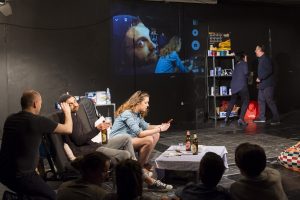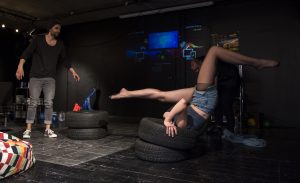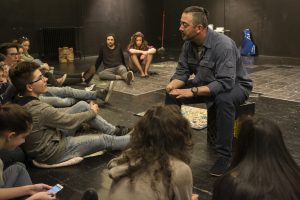SECRET DOOR
Duration: cc. 180’’
The Secret door speaks mostly for the teenagers as its main theme is how one can become an adult. During their adolescence their physical, mental and sexual maturation forces them (and their environment) to re-evaluate the different relationships they have. They have to reconstruct their views on peer and family relationships, their own connection to their changing bodies, and at the same time they have to adjust themselves to the “adult world”. This is a tender, yet important age, where the focus is placed on finding their own identity, and also the societal roles they have to fulfill. On the way on finding their identity the role of their own body increases. Both self-acceptance and testing the limits are important to them: what can their bodies endure, where are their limits.
The play tells the story of Julcsi, a 14 year old girl. She’s got an older brother, Lackó, who just turned 18 – they celebrate his birthday throughout the play. There’s also a family friend, few years older, than Lackó, who is usually present on the family occasions. At the beginning all three of them are in the father’s mechanic shop, creating a performance for the family celebration, which later the parents do not allow to perform: they say that it is too risky and loaded and in general not fit for the occasion. After the parents go home the three of them also leave and go to party. Julcsi tells her parents that she’s having a sleepover at a friend of hers, but instead goes back to the car shop and they all start drinking with the boys. Morning comes and the parents find their children, 18 and 14, and the truth can not be covered anymore – there has been lying and heavy drinking going on. On top of all that the parents have the feeling that there happened something else, something they still don’t know, just suspect…
During the play we ‘open up’ scenes and offer the participants to examine Julcsi’s situation from different viewpoints. They can think together about what the 18th birtthday means to teenagers nowadays, where are the limits for a 14 year old when it comes to partying, also at the end of the play they can make a performance about the obstacles a 14 year old has to fight today.
While working on the the play we consulted a psychologist specialized on this age group.This play can help sahping the relation teenagers have to adult roles, and isnpire them for social responsibility. The feedback so far shows us that the young people understand the importance of this topic and find the honest conversation about societal roles to be important.
Director: Péter KÁRPÁTI
Actors: Júlia LADÁNYI, László KÁLÓCZ, Gábor GYOMBOLAI, Anita PATONAY, András SEREGLEI
Dramaturge: Anna ZSIGÓ
Duration: cc. 180’ (with one break)
The complex theatre in education (TiE) performance is a theatrical education program, in which theatre scenes, episodes and related conversations, as well as specific interactive art forms are joined in an organic way to further process and think a story. The topic of the performance is always a moral/social problem, which examines humans as social beings living in the present. It is a genre in which the viewer is placed in the centre, and the creating presence of the viewer has become a method. The aim is not to convey the message in these performances, but to focus on the dilemma. The creators try to emphasise a question or a problem, where examination from multiple perspectives is inevitable. A forum is created, where opinions can be negotiated, different thoughts can be confronted in order to establish a dialogue between the participants. It is a dialogue between students sitting in the same classroom, students and adults with different values, worldviews. These performances can also be perceived as performative social interventions.
Explanatory and related concepts: interactive theatre / applied theatre / performative method / theatrical education / complex theatrical educational performance / social intervention / drama pedagogy / participation theatre / TiE – Theatre in Education / theatre pedagogy / political theatre / constructivist pedagogy / non-formal education / community theatre






